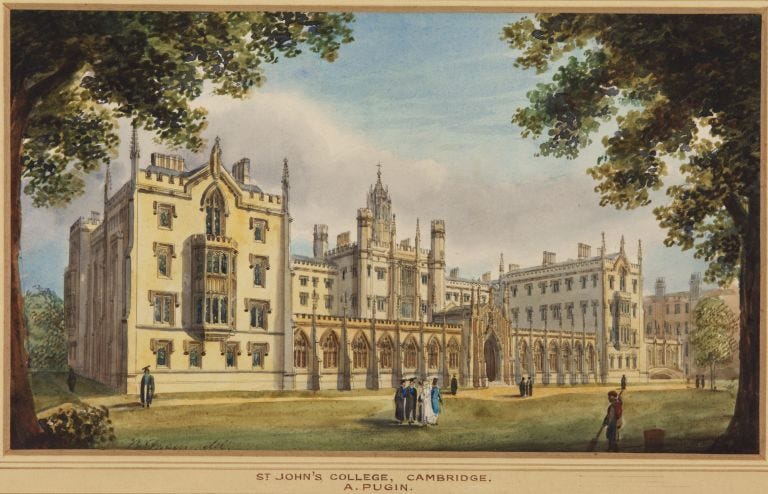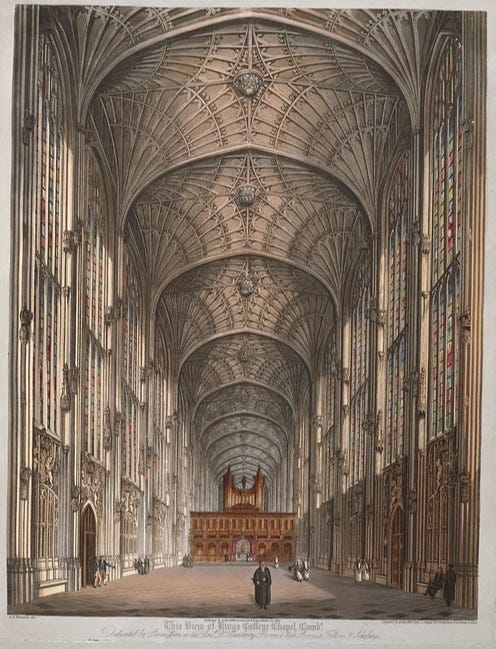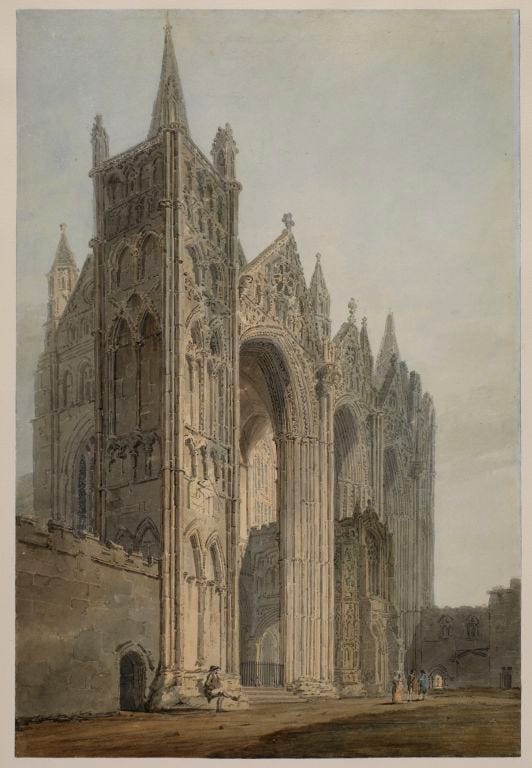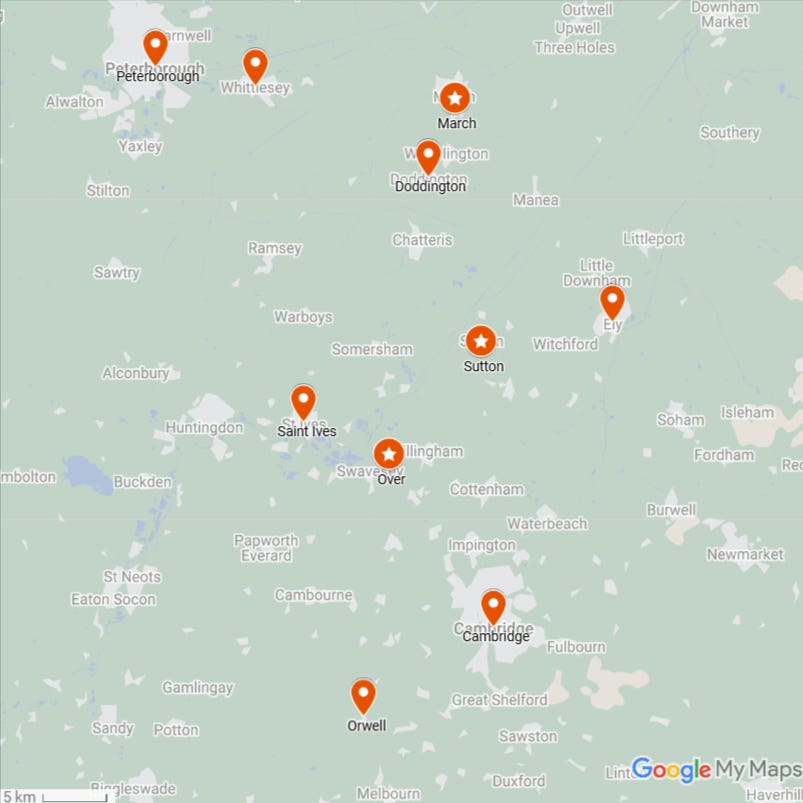Philip Lamothe Snell Chauncy (1816 – 1880), my third great grandfather, continues his memoir with events from 1838, beginning with his return to Over, Cambridgeshire, where he resumed his surveying work. His projects included a major land subdivision in Sutton. Hugh Snell Chauncy (1823 – 1900), his younger brother, joined him in Cambridgeshire to learn the trade. Later in the year an accident at work left Hugh with a permanent arm injury.
Philip’s health seems a little uncertain, and he continued to suffer from stomach ailments.
On 25 May, while travelling on the road to Peterborough, Philip had what he describes as ‘the most important event of my life’, an experience of religious conversion.
During the year Philip and his brothers visited historical sites, among them King’s College Chapel in Cambridge and Peterborough Cathedral.
When Queen Victoria was crowned in June, there was a grand procession in Sutton. Philip playing a leading role acting as the Archbisop . Philip also supervised the sports and firework display on the day.
Despite his chronic illness, Philip continued his work and social life, and he kept up his correspondence with friends and family. His year ended with visits to London and to his great-uncle’s mansion at Edmonton.
1838
Having somewhat recovered my health during my visit to my Father’s house at Islington I returned on the 1st January to my lodgings in the village of Over in Cambridgeshire to continue my survey of the parish.
My brother Hugh accompanied me from London in order that he too might be articled to Mr. Jackson and might begin to learn surveying under me at Over.
I proceeded with the survey until the 19th Jan when Hugh & I met Mr Jackson at St. Ives in accordance with his instructions, and we all returned home to March.
On the 22nd Jan we were out skating on the river Nene, the thermometer stood at 18 degrees below zero, which was supposed to be the most intense cold in this part of the country in the memory of Man.
All this time, I suffered so much with my stomach complaint as to be in a continual state of misery.
Until the 7th Feb I was plotting the Over survey at March.
I skated a good deal at this time and in the evenings we used to play Chess—the Misses Jackson and I. There were several interesting skating matches for winter on the Nene.
On the 8th, I began reading Isaac Taylor’s “Physical Theory of Another Life“—a wonderful book which made a deep impression on my mind and much of which I have never forgotten.
I returned to Over for a few days & finished the survey & went on to Cambridge to consult Dr. Thackeray regarding my complaint. He prohibited me from taking ginger or any stimulants.
On this Visit to Cambridge I called on my acquaintance Algernon Woodward at St. John’s College & went over some of the most remarkable of the colleges and other buildings. King’s College Chapel is a very wonderful and beautiful structure.


About this time I received several letters from my sisters Theresa & Martha (Mrs Berkeley) and became very much interested with the accounts of the new province of South Australia.
From the 16th Feb. I was much better in health.
I kept up a regular correspondence with Wm. Noel Jackson of Barkway, who was with me on the Orwell survey & whose eldest sister married Mr. Robt Gouger the first Colonial Secretary of South Australia.
On the 6th April, my stomach complaint returned and continued very bad indeed for several weeks. The pains in the chest and head were very violent & the inflammation, irritation, and congestion of the mucous membranes of the bowels most distressing. When the worst symptoms left me, I remained very weak and poorly but could go into society. On the 19th, William visited me from London and remained until the 9th of May. We varied our amusements, quoits, cricket &c. at Mr. Jackson’s with rides and journeys to the surrounding country. We visited the Rev. Algernon Peyton, Rector of Doddington, and Wm. took a drawing of his beautiful and unique “cottage.” He was then the richest Rector in England, receiving £13,000 a year from the great tithes.On the 9th Wm. & I visited that magnificent structure King’s College Chapel and several of the Colleges in Cambridge.
On 25th, I proceeded through Whittlesea to Peterborough, and it was while driving along the road in a gig by myself that what I have been in the habit of considering the most important event of my life took place—namely, my conversion.
I still distinctly remember that I felt in an unusual manner an overwhelming sense of my responsibility to GOD and that He then—if never before—pardoned my sins and adopted me as His own saved one thro’ Jesus Christ my Lord and Saviour—i.e. Himself when manifested in the flesh.
Being confident of this very thing, that he which hath begun a good work in you will perform it until the day of Jesus Christ Phil. 1.6.
While at Peterborough I went over the magnificent Cathedral. It is built in different styles of architecture—Roman, Norman, and Gothic, was foundedA.D. 654 by the King of the Mercian, added to by Hen. VII, with a roof in the style of King’s College Chapel, Cambridge, and is supposed to contain the oldest monument in England, dated 870, in commemoration of the Monks who were massacred by the Danes in this City. There is in the Cathedl. an oil painting of old Scarlett who buried 3 generations in this parish – among them was Catherine wife of Hen. VIII and 50 years after Mary Queen of Scots who was beheaded 5 miles off at Fotheringay.

On the 21st May that extraordinary character Octavius Western came for 3 yrs to Mr. Jackson’s to learn surveying. He had been Expelled from Rugby and from Addiscombe military college altho’ now only 17 yrs of age.
As I shall be referring to Western again I will now proceed with my narrative in the order of events. —-
On the 4th of June, having packed up our traps, Mr. Jackson and myself, Hugh and Western, traveled to Sutton near Ely and put up at the Ship Inn. On the following day, we engaged a sufficient number of men and commenced the survey of the “open fields” and “meadlands” of that parish with the view of an entirely new subdivision of them among all those interested. These lands consist of copyhold tenures interspersed with common “balks”, “ways”, “headlands” and “meres”, in which all the owners of “old enclosures” held in fee within the parish, have, in most openfield parishes, a “common right” to depasture their cattle at certain seasons and under definite restrictions. The regulations regarding which are, or were then, frequently engraved on parchment and kept for the use of those concerned in the vestry of the parish church.Of course an Act of Parliament had to be obtained by these copyright holders—generally at a cost of about £500—in order to legalize the desired readjustment. This innovation on the ancient custom always provoked a strong opposition from the holders of Common rights, for they seldom though that the same allotment which would be apportioned to each instead of his right to depasture his one, two, or more cows on his “stint” of sheep would be an equivalent to the loss sustained by him through the enclosure of the whole of the open fields of the Parish.
Mr. Jackson divided our party into two companies, the one accompanied by Hugh, under his own direction, and the other with Western, led by me. I soon discovered that Western was intractable and wilful, but I managed to get through the day’s work without anything noteworthy occurring, but what was my surprise on returning to the Inn in the evening to find poor Hugh with his arm in a sling. It was his first day out surveying and they had only begun a few minutes when Hugh, while running in a field, stepped into a deep little drain the hard edge of which caught his right arm and broke the bone half an inch below the elbow. Mr. Pirkhard, the local leech, was sent for and pronounced the case to be one of dislocation. Having manipulated the arm, he said he had set the joint, but as swelling set in, Mr. Jackson took him home to March, where the fracture was properly reduced by Surgeon Church. Poor Hugh had always been remarkable for the absence of ordinary prudence and accordingly during this painful period he managed within a few weeks to break the bone in the same place twice again until at length the natural joint became stiff and the ill used fractured bone declined to throw out алу more osseous matter but formed itself into a fresh joint- His arm remains weak and troublesome to the present day after a lapse of nearly forty years.
I must not here omit giving some account at our proceedings in the usually quiet village of Sutton on the 28th June in honour of the Queen’s Coronation which took place in Westminster on that day- if only to shew how such things were done at that time in an English country village.
Mr. Jackson kindly sent us about eleven pounds worth of fireworks for the auspicious occasion. A Coronation committee having been duly elected from among the farmers and others, and the program drawn out, a pretty village girl was selected to represent her Majesty and they dubbed me Archbishop, I also held some other minor offices. Then there was a grand procession, the carriages consisting for the most part of carts and wagons.
At 1 o’clock we drew up in front of the Chequers Inn where “the Queen” sat in state and then one Badger & I Escorted her to her carriage. It fell to my lot to be both coachman and herald for I drove the carriage in which she sat by my side. – Oh how well do recollect my feelings were at this distance of time as I looked down on the pretty young creature – and I proclaimed her four times through the village – whether with a loud voice or not I am unable now to say.
The village folk were highly entertained with this grand pageant and when it was so far over were well pleased to go to dinner. Nearly a thousand of the inhabitants, sat down to a great feast consisting of boiled and baked beef and mutton and plum pudding. – I need not stop to set forth the importance of this part of the proceedings to English villagers – dinner over the grand ceremony of the day was next proceeded with. The “Queen” having been drawn round a field or – to use the local term – “close”, I crowned her amid the cheers of the people and then we drove round the close again having been attended during the whole time by Maids of honor, Grooms in waiting and others.
This event being over the sports began -climbing the pole, bobbing for oranges & rolls dipped in treacle, running for cobs, gowns &c. by the women and girls, jingling match, jumping in sacks &c. They made me superintendent of the games and I awarded the prizes & in the evening had the management of the fireworks – they were considered very splendid. A dance in Mr. Drages large barn wound up the amusements during the small hours of the morning.
After finishing the survey of Sutton I was Engaged in Surveying and general routine work till the End of the year.
My ailment however never entirely left me during all this time. On the 14th Sept. I find an Entry in my diary as follows – My illness consists of my old stomach complaint, obstinate constipation, pain in the bowels, head &c, and great prostration & weakness tho’ I am able to walk about.
I was in London on a visit to my Father for my health from the 5th to 21st Sept. From the 22d to 24th. Oct I accompanied Mr. Jackson to a meeting of the Sutton Enclosure Commissioners & proprietors at Ely, and went to the Cathedral and saw Dr Allen the Bishop.
From the 24th to 29th Dec I was again in London on a visit to my Father. He and I spent 2 or 3 days at the mansion of my great uncle John Snell of Edmonton a very wealthy old bachelor.
My brother William was also at home at this time and sisters Eunice, Anna and Sophia had returned from school.
On the 29th Dec I want to see the commencement of the Great North Western railway, and on the 30th returned to March.
Philip’s training as a surveyor continued until 1839. I will resume his account of his training in a future post.
Related posts and further reading
1877 Memoir by Philip Chauncy
This post first published at https://anneyoungau.wordpress.com/2025/02/02/philip-chauncys-memoir-1838/



I am just catching up Ann. This memoir is wonderful to read. I loved his description of Coronation Day celebrations at Sutton. I'm pleased you included the map. I do have a little family history in Cambridgeshire, but wasn't sure where Over and Sutton were. I'm off to read the follow up posts.
What a treasure his memoir is!! And as a surveyor, to have seen so much of the country, and written about it. Simply marvellous.